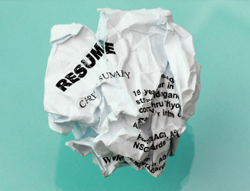Four Tax Tips for the Recently Unemployed
03 June 2011

Sudden unemployment can come as a shock. But it’s important to get organized right away. If you are accustomed to working for someone else, for example, you have to make a huge mental adjustment: You are now in business for yourself. And your business is marketing yourself to potential employers, with the goal of securing a new job.
If you have been a W-2 employee all your life, you may not be used to thinking very much about taxes. But now that you are in business for yourself, it’s important to take the initiative to organize your records, and take advantage of every tax break you can. Now that you are unemployed, you need these breaks now more than ever. Here are three things you can do to get started.
1. Start a mileage log. Miles you drive related to a job search are a deductible expense. Take a clipboard and put it in your car, and start noting your mileage, every time you make a trip related to your job search. As of 2011, you can deduct 58 cents for every mile you drive for the purposes of conducting a job search within your current profession. For example, deduct mileage for these trips:
• Interviews
• Networking events
• Meals with people related to your job search, provided you discuss your job prospects. (1/2 the cost of the meal is deductible, too.)
• Professional organization meetings
• Visits to employment agents or skill testing centers
Tip: You can find a free mileage tracking iPhone app here.
2. Take the home office deduction. Your full-time profession is your job search. Set up an office at home for this purpose. You can deduct a portion of your mortgage or rent, as well as a portion of your utilities for the business use of your home – including a home office you set up for the purposes of conducting a job search.
To figure the deduction, estimate the square footage of the space you devote exclusively to a home office. Divide the square footage you use for your home office into the square footage of your residence. For example, if you live in a 2,000 square foot home, and you devote 400 square feet to a home office, you can deduct up to 20 percent of your rent or mortgage and your utilities.
It doesn’t have to be a separate room, but it must be a space solely devoted to business use. You cannot use it for personal or recreation reasons.
What’s more, if you own the home, you can take an additional partial deduction for depreciation – the gradual wear and tear that comes with the aging of any home. You can only depreciate the home – not the land. For more information on the home office deduction, see IRS Publication 587 – Business Use of Your Home.
Tip: Take a photo of your home office and keep it for your records. Ensure there is no evidence in your photo of mixed personal and business use. This photo could be important later if the IRS attempts to challenge your deduction.
3. Deduct Job Hunt Expenses. As long as you are searching for a job in your current or former profession or industry, you can deduct any fees you pay to further that job search. This means you can deduct whatever you pay to employment agencies, resume preparation fees, mailing costs, professional organization membership dues, and even a cell phone bill, as long as the calls you make are for business purposes. You can deduct the cost of traveling to a job interview site, including air fare, rail travel and lodging, as long as the purpose of the trip is for the job search and not for personal reasons. So don’t try to visit your boyfriend in Hawaii for two weeks and show up for one job interview and try to deduct the whole trip.
To make the most of the deductibility of job search, keep meticulous records. Carry a folder or binder to gather all your receipts. In a pinch, you can take a close-up photo of the receipt with your cell-phone camera. Just be sure to transfer the file.
4. Further Your Education. Now may be a good time to take those classes you’ve been putting off, to upgrade your certification or even to pursue a master’s degree. Educational expenses are deductible if they further your skills and potential for advancement in your current field, and they do not qualify you for a new career field. For example, if you are a bookkeeper, you may be able to take classes in accounting and deduct the cost of tuition, books and fees. You cannot deduct the cost of attending flight school.
What’s more, you may even be able to take advantage of a tax credit for doing so. The Lifetime Learning Credit allows you to deduct up to 20 percent of the first $10,000 of qualified tuition expenses you incur. The credit is means tested, and begins to phase out if you earn over $47,000 per year (or $94,000 if you are married and file a joint return). For more information about the Lifetime Learning credit, see IRS Publication 970 – Tax Credits for Education.
5. Don’t Spend Your Whole Unemployment Check. Remember, in most cases, unemployment compensation is taxable income, just like your wages at work. You can have your state unemployment agency withhold 10 percent of your benefits for income tax by filing a form W-4V. When you do this, though, you are essentially providing the government an interest-free loan. If you don’t have the income withheld, however, you can expect to pay income taxes on everything you collect from unemployment insurance.
Wide spectrum of jobs is available at our CAREER section!
_______________________________




